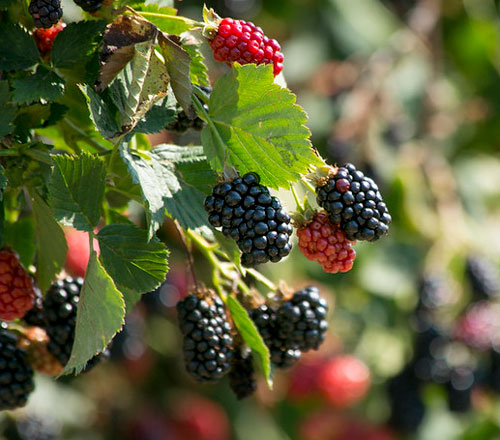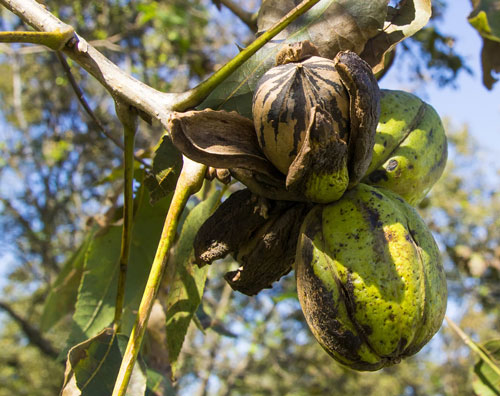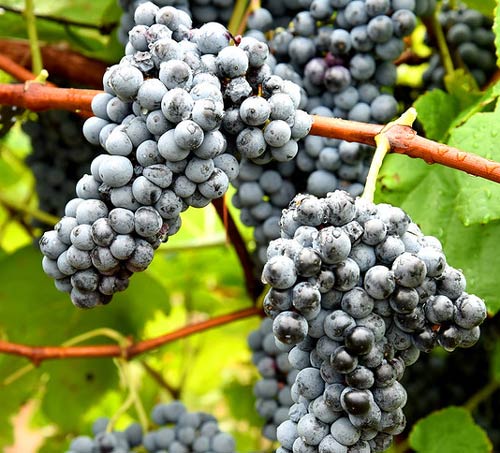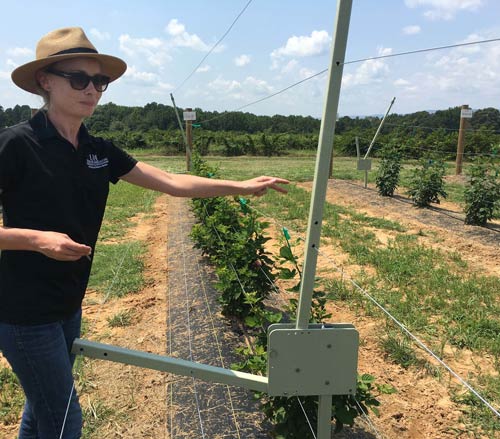Contact
Extension Fruit & Nut Specialist
Phone: 501-671-2229
Fax: 501-671-2252
Email: amcwhirt@uada.edu
University of Arkansas System Division of Agriculture
Cooperative Extension Service
2301 S. University Avenue
Little Rock, AR 72204
Commercial Fruits and Nuts in Arkansas
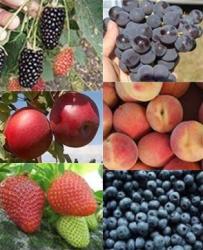
Arkansas' climate supports a diverse range of high-market value fruits and pecans. Our Extension agents and specialists are available to assist you with your questions.
Licensed Propagators: University of Arkansas Patented Fruit Cultivars
The Division of Agriculture's Technology Commercialization Office (TCO) helps faculty and research scientists with the University of Arkansas System identify, protect, and commercialize intellectual property developed from their research or other university supported activities.
To license University of Arkansas-developed fruit cultivars, please contact: agritco@uada.edu or Cheryl Nimmo at (479) 575-3953.
If you are purchasing these plants to propagate and resell, you must be a licensed propagator with the Division of Agriculture of the University of Arkansas System. Contact Cheryl Nimmo at cnimmo@uark.edu for more information about licensing.
U of A System Licensed Fruit Propagators
PDF maintained by the TCO.
University of Arkansas System Division of Agriculture Fruit Cultivars and Growing
Information
Website maintained by TCO; includes current and expired patents for blackberries,
blueberries, nectarines, peaches, table grapes and wine grapes.
![Compost | Getting Started - Planning Fruit Crops | Commercial Horticulture | Arkansas Extension Compost - life of the soil [Photo courtesy U.S. Composting Council]](/farm-ranch/crops-commercial-horticulture/horticulture/images/compost-us-composting-council-100px.jpg) Planning for Fruit Growing
Planning for Fruit Growing
Cultivar Selection
Selecting the correct fruit cultivars can determine the success of your orchard.
The commercial success of a fruit orchard is highly dependent on the selection of cultivars which will perform reliably for the selected site and location and meet market demands. When selecting cultivars for your orchard you must consider the following:
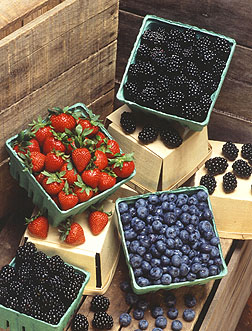
![]() Climatic adaptability of the cultivars
Climatic adaptability of the cultivars
The cultivars you select need to be adapted to the climatic conditions for your geographic
location. Pay close attention to the information given by the nursery catalogs such
as USDA winter hardiness zones and chilling requirements. Arkansas has six hardiness
zones (6a -8a). If your orchard is located in a colder area of the state (USDA hardiness
zones 6a or 6b), you need to select cultivars that are adapted to the colder winter
temperatures. If you are in the southern part of then you must select fruit cultivars
with lower chilling requirement hours.
![]() Time of bloom and days to harvest
Time of bloom and days to harvest
You can select early, mid and late season cultivars to extend or concentrate the season
to match a specific market. However, care must be taken to make sure that you do not
select cultivars that bloom too early, especially in crops such peaches because there
might be a danger of frost damage to the blooms. For fruit that require cross pollination
such as apples and pears, the time of bloom of the cultivars must coincide in order
to have viable pollen.
![]() Pest resistance
Pest resistance
One way to decrease the number of pesticide sprays you apply to your orchard is by
selecting cultivars that have some resistance to the major diseases in your area.
| FSA-6129 | Tree Fruit Cultivar Recommendations for Arkansas |
| FSA-6130 | Small Fruit Cultivar Recommendations for Arkansas |
| MP467 | Arkansas Small Fruit Management Schedule IPM (Integrated Pest Management), weed control for blueberries, blackberries, strawberries, grapes |
| Arkansas Fruit & Nut News - newsletter Dr. Donn Johnson | Department of Entomology | University of Arkansas |
|
| 2013-2014 Mid-Atlantic Berry Guide for Commercial Growers Cooperative Extension Service | Penn State University |
|
| Tree Fruit Resources Cooperative Extension Service | Cornell University |
|
| Southern Region Small Fruit Consortium University of Arkansas is a member. |
Soil Testing
| FSA-2118 | Understanding the Numbers on Your Soil Test Report |
| FSA-2118SP | Como Interpretar los Resultados de los Analisis de Suelos (Spanish version of FSA2118, Understanding the Numbers on Your Soil Test Report) |
| FSA-2121 | Test Your Soil for Plant Food and Lime Needs |
| FSA-2153 | The Soil Test Report |
| Soil Testing & Research Lab Agricultural Experiment Station | Division of Agriculture | University of Arkansas System |
![Pruning | Getting Started - Maintaining Fruit Crops | Commercial Horticulture | Arkansas Extension Pecan Pruning [Photo courtesy University of Georgia College of Agricultural and Environmental Sciences]](/farm-ranch/crops-commercial-horticulture/horticulture/images/pruning-pecan-uga-100px.jpg) Maintaining Commercial Fruit and Nuts in Arkansas
Maintaining Commercial Fruit and Nuts in Arkansas
Pruning & Training Fruits
| FSA-6133 | Two-Scaffold Perpendicular V - A New Training System for Arkansas Peach and Nectarine Orchards |
| Pruning and Training Fruit Trees by Dr. Elena Garcia, Extension Fruit Specialist | Division of Agriculture | University of Arkansas System |
|
|
Watch Video on how to prune thornless blackberries |
|
|
Watch video on how to prune apple trees in Arkansas |
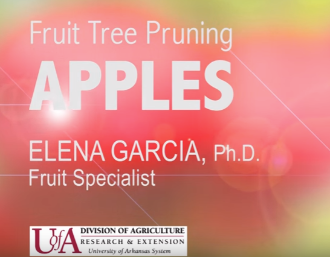 |
|
Watch video on how to prune peach trees in Arkansas |
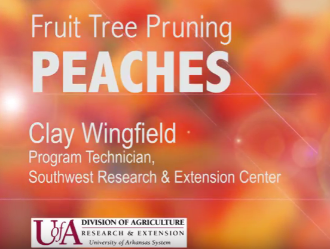 |
Pest Control for Fruits
| FSA-7079 | Spotted Wing Drosophila |
| FSA-7080 | Brown Marmorated Stink Bug |
| MP144 | Insecticide Recommendations for Arkansas |
| MP467 | Arkansas Small Fruit Management Schedule IPM (Integrated Pest Management), weed control for blueberries, blackberries, strawberries, grapes |
| Fruit & Nut Pest Management by Dr. Donn Johnson | Department of Entomology | University of Arkansas |
|
| Cornell Pest Management Guidelines for Commercial Tree Fruit Production | |
| Southern Region IPM Center National Institute of Food and Agriculture | USDA |
Disease Control
| FSA-6114 | Submitting Plant Samples for Disease Diagnosis |
| FSA-6132 | Foliar Sampling for Fruit Crops |
| FSA-7562 | Alternative Plant Disease Management Practices for the Home Garden |
| MP154 | Arkansas Plant Disease Control Products Guide; - complete guide Fruit Tree Diseases - Commercial - section Pecan Diseases - Commercial - section Small Fruit Diseases - Commercial - section |
| Plant Disease Image Library for Fruits & Nuts Cooperative Extension Service | Division of Agriculture | University of Arkansas System |
|
| Plant Health Clinic Cooperative Extension Service | Division of Agriculture | University of Arkansas System |
Weed Control
| MP44 | Recommended Chemicals for Weed and Brush Control for Arkansas - Fruits & Nuts |
| MP467 | Arkansas Small Fruit Management Schedule IPM (Integrated Pest Management), weed control for blueberries, blackberries, strawberries, grapes |
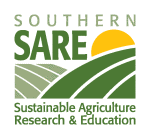 |
Southern Sustainable Agriculture Research & Education (SSARE) | Arkansas website |
| Organic Materials Review Institute (OMRI) The Organic Materials Review Institute (OMRI) provides organic certifiers, growers, manufacturers, and suppliers an independent review of products intended for use in certified organic production, handling, and processing. |
| FSA-41 | Organic Certification Process in Arkansas |
| FSA-42 | Organic Markets and Marketing in Arkansas |
| Organic Resource Manual for Arkansas | |
 |
Transitioning to Organic Sustainable Agriculture Research & Education (SARE) |
 |
Organic Guides for Fruit Production - Cornell University Extension These guides outline general practices for growing fruit crops using organic integrated pest management techniques. Topics include cover crops, resistant varieties, crop rotation, field selection, soil quality and nutrient management. |
| Organic Blackberries and Raspberries - University of Kentucky Extension | |
 |
Organic Blackberry Production Systems - Oregon State University |
| Organic Apple Project: OrganicA - University of Vermont The OrganicA Project is a collaborative partnership among three land-grant universities and stakeholders throughout in the region. The project includes both research and a closely integrated organic apple outreach program which is disseminating research findings, information, and insights. The long-term goal of this multi-state, multidisciplinary project is to enhance adoption of organic apple production in New England through research that advances the scientific knowledge base and provides practical information to stakeholders. |
Advantages of high tunnels relative to field production
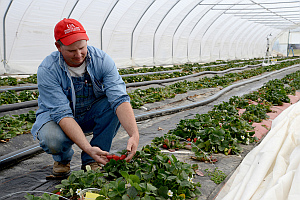
![]() Season extension/off season production
Season extension/off season production
![]() Reduced moisture on foliage from rainfall and dew
Reduced moisture on foliage from rainfall and dew
– Lower disease potential
![]() Increased growth rates and production
Increased growth rates and production
– Increased heat unit accumulation and retention
– More even light distribution
– Reduced plant stress
![]() Exclude insect pests and some animals
Exclude insect pests and some animals
– Plant health and food safety
![]() Controlled water application
Controlled water application
![]() Higher quality products
Higher quality products
The Potential for High Tunnels
presentation by Dr. Curt Rom & Dr. Elena Garcia | Division of Agriculture | University
of Arkansas System
High Tunnel Construction and Selection Considerations
presentation by David A. Dickey and Jason D. McAfee | Division of Agriculture | University
of Arkansas System
High Tunnels or Hoop Houses Education
Southern SARE
| FSA-9512 | Diagnosing Farm Profitability Problems |
| FSFCS-56 | Estate Planning Defined |
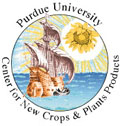 |
Arkansas CropMap View crops produced within Arkansas by crop, acres produced, and yield. Information for the entire state as well as individual counties. |
| Ag Risk & Farm Management Library Information on production risk, crop insurance, enterprise diversification, price risk, natural disasters, legal risk, and human risk. |
|
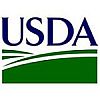 |
USDA Risk Management Agency The Risk Management Agency is part of the USDA with the goal of assisting producers manage risk through effective risk management solutions. The three divisions of the RMA include: Insurance Services, Research and Development (R&D), and Risk Compliance. |
 |
National Agricultural Statistics Service (NASS) - Arkansas USDA's NASS Arkansas Field Office is operated in cooperation with the University of Arkansas System's Division of Agriculture. |
 |
Economic Research Service (ERS) The ERS mission is to inform and enhance public and private decision making on economic and policy issues related to agriculture, food, the environment, and rural development. |
Marketing Your Products Directly (FSA31)
by Arkansas Extension
This publication shows you how to market your products directly and legal considerations.
Commodity Markets
by Arkansas Extension
This site provides various links to cash market prices, futures market prices, USDA
reports, market commentary and analysis, and other market related analysis.
Arkansas Grown
by Arkansas Agriculture Department
This website was developed by the Arkansas Agriculture Department (AAD) to help potential
buyers locate Arkansas producers. Any resident of Arkansas who produces an agricultural
product in our state may, at no charge, list their marketing information here. AAD
may also make this information available for distribution in other formats.
Agricultural Marketing Service
by USDA
This site provides information on the various AMS programs, discusses current hot
topics in agriculture, and provides various web resources to assist producers.
Farmers' Markets and Local Food Marketing
by USDA Agricultural Marketing Service
National Organic Program
by USDA Agricultural Marketing Service
National Organic Program page that supplies links for certifying agents, consumer
information, NOP regulations and policies, producers, handlers, and processors, and
state information as well as a link to the National Organics Standards Board.
Food & Farm Policy
by Arkansas Extension
The Agricultural and Food Policy webpages are developed as a resource to help users
increase their understanding of public decision making by providing sources of information,
data, analysis and news on public issues impacting Arkansas' agricultural and rural
sector.
Legal and Business Guide
by University of Arkansas System's Division of Agriculture
This book includes chapters on contract laws, food safety, food labeling, agricultural
labor, business organizations and the application of the Perishable Agricultural Commodities
Act. In addition, since the industry is also confronted by other unique challenges
that directly affect competitiveness, it also includes a chapter addressing the marketing
of various types of specialty crops and one discussing the third-party audit system.
Farmdoc - Law & Taxation
by University of Illinois
The educational materials provided on this site can assist producers, as well as others,
in understanding the impact of laws and regulations on agri-related decisions and
activities. Topics on this site include: Agricultural Biotechnology, Selling Agricultural
Products, Acquiring Farmland, Water, Natural Resources & Environment, Labor Law, and
Taxation.
Farm Labor Laws and Regulations
by Ohio State University
This site provided by Ohio State University gives a summary of labor laws and regulations
that affect agriculture.
